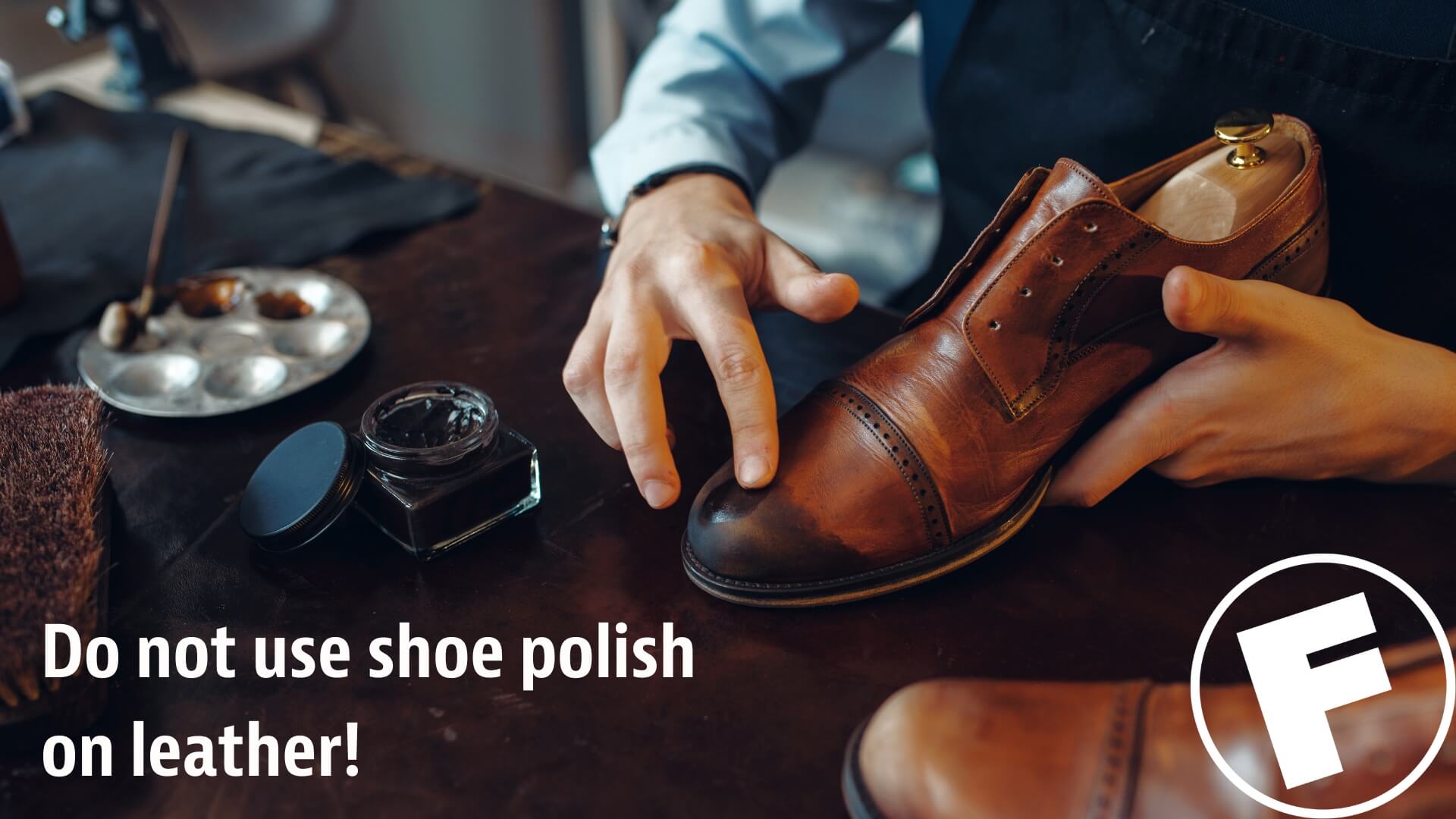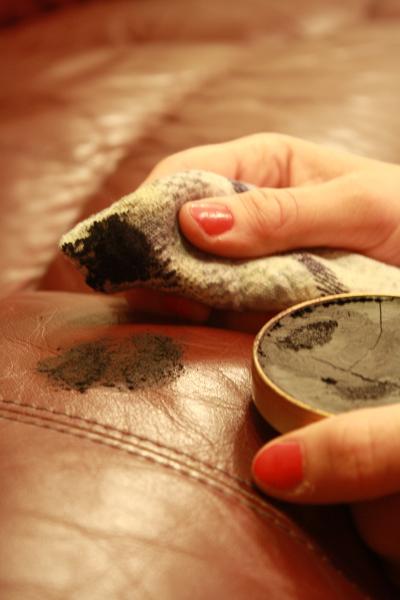Do not use shoe polish on leather upholstery!
Shoe polish might make logical sense as an easy way to renew the look of your leather upholstery and leather furniture. I mean, we use it to shine our leather shoes, right??
Beware, as the characteristics of the leather used in these different leather products are a whole different ball game. Read on!

You might’ve heard that it’s okay to use shoe polish to remove scuff marks and stains on leather.
Well, people try to use it on furniture and on their leather car seats—but that doesn’t mean it works! Any waxes or solvents can be counterproductive to leather care.
The leather used in upholstery is tanned differently from the leather in shoes. It does not soak up shoe polish as shoes do, so the polish will just sit on the surface of your leather and make a sticky mess.
Depending on the type of damage, you may have a number of other alternatives. Professional leather repair experts can usually fix scuffed, faded, torn, or otherwise damaged leather for a fraction of the cost of replacing or reupholstering furniture and auto seats.
There are a number of other home remedies and wives’ tales about using home products on leather. We do not advise using the following:
- Olive oil
- Beeswax
- Hair spray
- Markers
- Window cleaner
- Fingernail polish remover
- Disposable cleaning supplies and wipes
But the specific culprit of this article is shoe polish. Let’s learn more.
The Pitfalls of Using Shoe Polish on Leather Items: Opt for Safer Alternatives
Leather items exude a timeless elegance and charm that can effortlessly enhance our style and possessions. Whether it’s a pair of leather shoes, a wallet, a handbag, or a jacket, proper care is crucial to maintain their beauty and longevity. While many may instinctively reach for shoe polish as a go-to solution for leather care, it’s essential to understand why this might not be the wisest choice.
The Downside of Shoe Polish on Leather:
- Color Mismatch: Shoe polish is specifically formulated for footwear, and the colors might not match the leather items you intend to treat. Using the wrong color can lead to uneven and unsightly results.
- Chemical Composition: Wax polishes often contain chemicals and pigments that are tailored for shoe leather’s unique properties, which might not be suitable for other types of leather items. These chemicals can potentially damage the leather’s natural fibers and finish.
- Residue Buildup: The waxy nature of shoe polish can cause residue buildup on leather items. Over time, this buildup can dull the leather’s sheen, making it appear lifeless and worn.
- Sticky and Messy: Shoe polish can become sticky when applied to other leather items, attracting dust and dirt. This can create a messy situation that is difficult to clean.
Safer Alternatives for Leather Care:
Any leather care products that have been formulated to serve the unique characteristics of leather will always be your safest bet.
- Leather Conditioner: Opt for a high-quality leather conditioner that is specifically designed for the type of leather you’re treating (especially for unique and delicate leathers like suede). Leather conditioners provide the necessary moisture and nutrients to keep the leather supple and prevent it from drying out and cracking.
- Leather Creams: Leather creams are a versatile choice for various leather items. They are formulated to moisturize, soften, and rejuvenate leather without causing damage or color inconsistencies. Apply leather cream in a gentle circular motion, buffing it with a soft cloth for the greatest effect.
- Leather Wipes: Pre-moistened leather cleaning wipes are convenient for quick touch-ups and regular maintenance. They help remove dirt and stains without the risk of residue buildup. Wipe leather items down, paying attention to all creases and surfaces.
- Natural Oils: Some natural oils, like coconut oil and jojoba oil, can work wonders for leather care. They nourish and protect the leather while maintaining its original luster. Use a clean cloth and gently massage the natural oils into the leather, then reapply more with the dry cloth as needed. Mink oil is a good example.
- Soft Brush or Cloth: Regularly dust off your leather items with a soft brush or cloth to prevent the accumulation of dirt and debris. This simple step goes a long way in maintaining their appearance. Check out our specially-designed applicator and microfiber cloths to keep your leather goods protected.
Save the shoes polish for your fashionable footwear
In the pursuit of maintaining your leather items’ allure and durability, avoid the temptation of using shoe polish as a catch-all solution.
While high gloss dress shoes are definitely eye-catching, the best shoe polish and shoe care techniques won’t do for leather furniture and upholstery.
The unique characteristics of different leather items require tailored care to avoid irreversible damage. Instead, opt for purpose-built leather cleaners, creams, wipes, and natural oils that are designed to enhance and preserve leather’s innate beauty. By embracing these safer alternatives, you’ll ensure your leather items continue to captivate with their timeless charm for years to come.
Need leather repair services? Get in touch with your local Fibrenew professional today.
Passionate about leather care? Maybe a Fibrenew franchise is something that would fit you perfectly! Get more information now.



